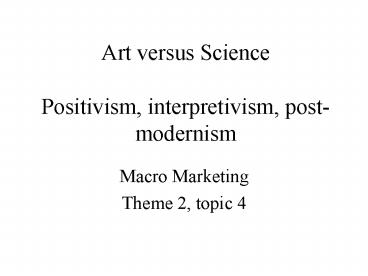Art versus Science Positivism, interpretivism, post modernism - PowerPoint PPT Presentation
1 / 21
Title:
Art versus Science Positivism, interpretivism, post modernism
Description:
Positivism, interpretivism, post- modernism. Macro Marketing. Theme ... Post modernism. Anti-modernism. Not order and rationality: irrational and disordered ... – PowerPoint PPT presentation
Number of Views:210
Avg rating:3.0/5.0
Title: Art versus Science Positivism, interpretivism, post modernism
1
Art versus SciencePositivism, interpretivism,
post- modernism
- Macro Marketing
- Theme 2, topic 4
2
Positivism
- The key idea of positivism is that
- the social world exists externally, and
- that its properties should be measured through
objective methods - there can be no real knowledge but that which is
based on observed facts - reality is external and objective .
- Knowledge is only of significance if it is based
on observations of this external reality - (Easterby-Smith et al. 1991)
3
Interpretivism
- The key idea of interpretivism is that
- the social world exists according to how it is
perceived and interpreted by people - understanding of the world is reached by taking
account of multiple realities, different
perspectives and views - focus is on understanding different situations,
in the context of different times / places/
people
4
Post modernism
- Anti-modernism
- Not order and rationality irrational and
disordered - Knowledge bounded
- Generalisations limited
- No universal truths
- Progress debatable
- Ephemeral, chaos fragmentation
5
DIFFERENT RESEARCH PHILOSOPHIES
- Interpretivism Defined-
- Interpretive
- Understanding
- Multiple realities
- Conceptual
- Situation specific
- Positivism Defined-
- Scientific
- Objective
- Validity Rigour
- Generalisable
- One reality
TO WHICH PHILOSOPHY DOES YOUR RESEARCH BELONG?
6
RESEARCH PHILOSOPHIES ROLE OF THE RESEARCHER
POSITIVISM/ POST-POSITIVISM
INTERPRETIVISM/ RELATIVISM
- Detached, external observer
- Clear distinction between reason and feeling
- Aim to discover external reality rather than
creating the object of study - Strive to use rational, consistent verbal,
logical approach - Seek to maintain clear distinction between
facts and value judgements - Distinction between science and personal
experience
- Researchers want to experience what they are
studying - Allow feelings and reasoning to govern actions
- Partially create what is studied, the meaning
of phenomena - Use of pre-understanding is important
- Distinction between facts and value judgements
less clear - Accept influence from both science and
personal experience - Primarily non-quantitative
7
CONTINUUM OF RESEARCH PHILOSOPHIES
Positivism
Interpretivism
Scientific Post-
Relativism Post- Positivism
Positivism/
Modernism Realism
Neo
Modern
8
RESEARCH PHILOSOPHY A POSITION
Positivism
Interpretivism
Scientific Post-
Relativism
Post- Positivism Positivism
Modernism
Research Position
9
FOCUS OF RESEARCH PHILOSOPHIES
Concentrates on
Concentrates on description
understanding and explanation
and
interpretation
10
RESEARCH PROBLEM AND RESEARCH POSITION
Positivist/ Interpretivist/ Quantitative
Qualitative What? How should? How and Why?
Limited number Complex number of issues
of issues Seeking
generalisation Seeking explanation/
understanding
11
Art versus science debate
- Applying unnecessary trappings of science to
marketing? - Difficulties - achieving overarching theory,
objective knowledge, unified method - Alienates practising manger and prospective
managers? - Is marketing an Art?
12
Art versus science debate
- Marketing is an art
- It uses tools, techniques of aesthetic
appreciation - Focuses on endeavours of marketing practitioners
13
Is Science Marketing?
- The marketing mix
- Target markets
- Marketing objectives
- - all developed in the context of science
- Peter and Olson (1983)
14
Key Questions
- Is marketing a science?
- Although scientific procedures are employed in
marketing, marketing is an art? - Is marketing an art?
- The marketing of ideas?
- Should marketing be artistic?
15
Marketing scientific theories
- No defensible criterion for distinguishing
science from non-science - purpose of science is to create useful knowledge
- to the degree that marketing has done so, it can
be labelled a science - Peter and Olson (1983)
16
Marketing, Scientific Progress and Scientific
Method
- Scientific credentials couched in terms of an
idealised notion of science as the ultimate
source of objectively certified knowledge. - Much research remains scattered and fragmented
- Difficult to determine what problem the research
is attempting to solve or - If the solution have any real significance to
advancement of knowledge - Follow-up studies are rare (Anderson 1983)
17
What Marketing Needs
- Needs greater commitment to theory-driven
programmatic research aimed at solving
cognitively and socially significant problems - This will contribute to a body of theory and
collection of scientific problem that can count
as being solved - (Anderson 1983)
18
Managerial/consumer perspectivesresearch
techniques
Managerial perspective
Consumer perspective
Analysis of company reports/materials In-depth
interviews/discussions Observation Managerial
diaries
Surveys Focus group discussions Observation Experi
ments
19
- Emphasis on theory testing measuring
- Prior theory used to generate hypotheses
- Deductive
- Relatively structured
- Researcher objective, external perspective
METHODOLOGIES IN CONTEXT OF RESEARCH PHILOSOPHIES
POSITIVISM/ POST-POSITIVISM
Surveys other multivariate techniques
Surveys structural equation modelling
Instrumental Case Studies
In-depth/Convergent
Interviews/ Focus
Groups(with/without interview protocol)
Action Learning/ Discovery
Learning.
Ethnographic
Emergent
Studies .. ..
Studies
Grounded
Theory..
Case Studies...
INTERPRETIVISM/ RELATIVISM
- Emphasis on theory building, meaning
understanding - Prior theory may be used at various times
- Inductive
- Relatively unstructured/semi-structured
- Researcher involvement as instrument
20
Overview - art and science
- Strengths of scientific perspectives
- rigour, stability, validity, structure,
dependability, reliability, comparability - Strengths of artistic perspectives
- creativity, innovation, vision , flair,
uniqueness, individuality
21
Overview - art and science
- Is marketing or business solely scientific or
artistic? - Marketing and doing business are partially both -
art and science - Both need structures, rigour, etc and artistic
flair - Marketing as a professional discipline drawing
from both






























